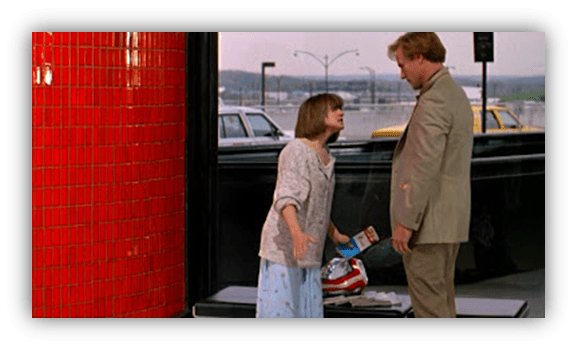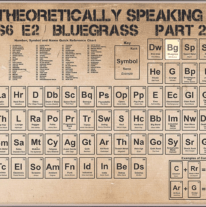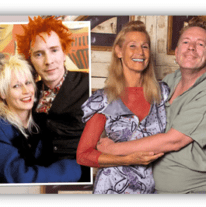Cappie ties it all together in this Venn-diagram finale of his Superman / Broadcast News / Network trilogy
“…there’s a reason that people should be watching…”
– The underground comic book writer
It was not your standard interview.
The late night talk show host found his studio being hijacked by a guest:
An underground comic book writer, familiar to regular viewers for being an everyman, a working stiff with an honest-to-goodness day job, unimpressed by the trappings of showbiz.
This time, the underground comic book writer’s provocations went outside the usual parameters of acceptable dissonance.

His past appearances, started out from an authentic place, unlike the wholly scripter Andy Kaufman/Jerry Lawler smackdown, but also was, albeit to a lesser degree, performatively self-aware, in which the interview became a skit about itself built on improv, a highwire act, but with a balancing pole and net.
The audience could breathe during these patented spats. This time, the underground comic book writer had news to break, as if Nightline crashed the soundstage like that agitprop spoof about the profession of journalism Mel Brooks never made.
The late night talk show host was furious.
“I just feel like this is not the forum for our discussion.” His protestation was met with dismissive hand gestures and shushing. Put on the spot, accused of being a “company shill”, the late night talk show host put a halt to any further discussion about his bosses’ legal woes pertaining to faulty nuclear reactors in the Midwest. That was a musical cue the bandleader missed. For this night only, the bandleader hosted the world’s most intimidated band.
The late night talk show host lost it.

“You’re a guest in my house so shut the **** up.”
The commercial break had arrived too late. In retrospect, it would seem that somebody who wielded power at the network had a stern talk with the late night talk show host since his housewarming prank went awry from the year prior.
It’s a character arc not so dissimilar from the one that Howard Beale (Peter Finch) undergoes:
Becoming overnight: a mouthpiece for Arthur Jensen (Ned Beatty), UBS’ corporate overlord, after he reads the riot act to his rebellious anti-establishment employee.

Goliath got David to lay down his slingshot.
The late night talk show host, and ostensibly, his network’s news division, wasn’t going to report on their employer’s malfeasance.
Very few people, most likely, knew what the underground comic book writer was talking about.
Mid-eighties America had moved on from the Three Mile Island crisis. Chernobyl, a tragedy, for sure, a never-ending horror story, but what happens overseas has a tendency to stay overseas. The hard news vacuum was starting to happen.
“I love it.”
“Suicides, assassinations, mad bombers, mafia hit men, automobile smash-ups. “The Death Hour.”
“A great Sunday night show for the whole family.”
-Max Schumacher
When the cat is away, the mice will play.
The cat is not Ernie Merriman (Robert Prosky), the DC bureau chief, it’s Jane Craig, stickler for ethics, who can be counted on to be an early morning hours buzzkill as her colleagues s*it-talk over coffee, tossing out hypotheticals with moral dilemmas that journalists face in their profession.

Aaron Altman (Albert Brooks), a veteran reporter, and also the only person in the newsroom who can relate to Jane’s perfectionism, looks close to ashen by everybody’s acquiescence towards filming death row executions without the slightest pretense of deliberation.
And they’re all sober, drinking the same bad office coffee from Styrofoam cups, presumably, not pass their expiration date. The new normal was in its incubation stage. Conversely, the UBS news president is drunk when he pitches his fantastically morbid show to Howard Beale, whose alcohol-fueled death wish prompts the barroom brainstorm.
Airing state-sanctioned murder events on the six o’clock news is just six degrees of Diane Christensen’s pet project, THE MAO TSE-TUNG HOUR, the proto-reality show in NETWORK: Starring real-life members of a domestic terrorist group:

The Ecumenical Liberation Army:
Who film their own revolutionary acts for Nielsen families. Aaron knows what Jane would say: “It’s just not news.”
It’s spectacle.
“Ask yourself how we were able to see them when he only had one camera and that was pointing at the girl during the interview.”
-Aaron Altman
Jane lost the war. Paddy Chayefsky predicted she would lose the war.
Jane Craig was a gatekeeper. The gatekeepers, one by one, retired or died, until there was nobody left to stand sentinel against the snake oil salesmen with forked tongues, the proverbial barbarians.
Jack Nicholson plays Bill Rorich, a network anchorman in the key of Cronkite, an old school journalist, aware of the fast-approaching sea change. In a key scene from BROADCAST NEWS, he remains in profile and is rendered speechless, while still on-air, several beats too long after Tom Grunick signs off, wondering if he just witnessed the paradigm shift.

He can’t face the camera, the cameraman, his audience; as if embarrassed about the segment his network just ran on date rape.
And he wants to disassociate himself from subject matter he deems as lurid sensationalism.
Back in DC, while Tom’s colleagues give the story their undivided attention, Aaron is beside himself, suddenly angry at Jane’s complicity in the matter. “You really blew the lid off nookie!” he blurts out to the heartthrob reporter and moonstruck producer. Tom Grunick (William Hurt), telegenic but undereducated, constitutes the devil in Aaron’s eyes, warning his lovesick friend: “He will just bit by bit lower our standards where they are important.”
Jane comes around in the penultimate scene, the airport scene:

In which she prioritizes her professional life over her personal one as the life that matters more because she is, in essence, married to the news. Jane wants to board the plane with Tom, bound for some tropical paradise, but she can’t cheat on her first love.
The editing bay turns out to be Jane Craig’s own special hell.

The anchorman faked a tear.
And Tom flunked her purity test:
By comparison, while on assignment in Central America, Jane makes sure that it’s the contra soldier’s idea, not her camera operator who facilitates the lacing of boots with direction to their Nicaraguan subject.
Jane Craig’s piety seems quaint now, even for her. Seven years pass.
Like Jane, even the best of us can change without notice as shifting political and social norms make allowances for shapeshifting fluidity. Jane goes in league with the devil, following Tom Grunick to New York as the network’s content manager. How many shouting matches with her bosses and slammed doors were there during “skategate” before she quit…or gave the directive to cover it to the hilt?
“Television news might just be something I love, as well as something I might be good at.”
-Louis Bloom
Louis Bloom is a NIGHTCRAWLER, not to be confused with the Marvel Comics superhero, the emo mutant with an ability to teleport. Kurt Wagner, the name Nightcralwer’s mama gave him, believes in god, reads poetry, and most interestingly, likes pirate movies.

Louis Bloom (Jake Gyllenhaal), a petty thief, unemployable and yet, smart; a quick study.
By chance, is on his way home from the scrapyard. He witnesses cameramen rushing towards a fiery roadside car crash on interstate 105. He sees opportunity, a future in blood; the news segment as miniature exploitation films. It’s all spectacle now, what constitutes as being newsworthy in the 21st century, fare more suitable for a drive in theater.
The ambulance chasing reporter, a “stringer”, sells his graphic footage to television stations in the surrounding L.A. area. Just like Nightcrawler – Kurt Wagner when he’s chillin’- Louis watches TCM, laughing as the head of Danny Kaye, in Norman Panama and Melvin Frank’s THE COURT JESTER, inches guardedly upward after a knight decapitates the armored helmet from its suit.
It’s no coincidence, perhaps, that filmmaker Dan Gilroy chose to name a film about journalism after one of the X-Men.
There are no heroes, no villains either in this post-moral underworld, just sociopaths with varying degrees of malignant narcissism. Clark Kent doesn’t trawl the megahertz by twilight in this desperate town, a former wonderland wondering what happened to all the supermen.

Rick (Riz Ahmed), the lost soul Louis hires to be his navigator, sits shotgun in the red car, looking like Robin to Louis’ very Dark Knight.
The compass-less sidekick fights traffic, not crime, with his cell phone equipped with GPS.
Their enterprise, Video Production News, in very short order; man, man bites dog, man bites man, becomes the leader of this shadow industry. The footage Louis shoots is too good to be true.
But it’s not news; it’s entertainment, “a great Sunday night show for the whole family,” Paddy Chayefsky once wrote for William Holden. Nina knows what Louis brought her is staged, unless the ejected driver, possessing the eye of an artist, dragged his broken body a few inches on the freeway so he could be lit by headlights, giving Louis something better to work with. Blood on her stringer’s clothes. Blood is weighed in ratings shares.

Louis’ mentor, Nina Romina (Rene Russo), the KXLA morning news director, doesn’t have a prepared speech on having scruples in her back pocket.
Nina looks the other way, reappropriating “suspension of disbelief”, a filmic term normally associated with fictional narratives, as a means to augment her moral universe and disallow the concept of introspection from evolving into conscience.
Whenever Louis drops off video at the small station, the place looks cold, as if hell froze over. Did one of these mercenaries; a newsreader, a camera operator, a broadcast technician, a news editor, the guy who runs the teleprompter, or a grip, ask themselves: “What am I doing here?” after one more warning of “viewer discretion is advised,” intoned by newsmen and women, numb to pixelation. It’s definitely not the morning news director.
She describes the news as a show to Louis, “a screaming woman running in the street with her throat cut.” Diane Christensen(Faye Dunaway) couldn’t have said it any better. “The Death Hour”, realized.
“Clark, you know some people get to go all the way to Smallville and then there are others who have to go to Bermuda.”
-Lois Lane
Clark Kent is a nerd.
Even Kal-el can’t help but pick on his fata morgana in SUPERMAN III, directed by Richard Lester, when the god, afflicted with synthetic kryptonite poisoning, tries to kill his alter ego, man, in a junkyard of steel.

Clark prevails over, perhaps, a Superman in the Nietzschean sense of the word, an outre Ubermensch, an overman for the silent masses.
SUPERMAN III, a Richard Pryor vehicle, a film without the presence of Lex Luthor (Gene Hackman), exchanges analog for digital brains as a counterpoint to Superman’s brawn. The antagonism in this, at times, Jacques Tati-like comedy (think MON ONCLE), is embodied by the interdependent relationship between man and machine.
Gus Gorman (Richard Pryor), a data processing genius, who like physicist Robert Oppenheimer, had his invention, in this case, a supercomputer, taken away by people with unchecked power: Webscoe Industries CEO Ross Webster (Robert Vaughn) and his sister Vera (Annie Ross) who intend to repurpose science and technology as a means to rule the world.
But the billionaire siblings are overmatched by the supercomputer gone rogue, a precursor to the hegemonic shift people wary of artificial intelligence talk about in hushed tones.
Gus realizes what can happen when technology falls into the wrong hands.
Realizing the greater risk, the data processing genius helps Superman:

Redeeming himself like Robert Oppenheimer, who was awarded the Enrico Fermi Award in 1963. Where is Lois Lane to write about the moment Gus’ invention staves off death by locating its own electricity source. That’s her Pulitzer.
“Next!”
– A clerk
Gus Gorman could’ve held a grudge.

The woman at the Metropolis Unemployment Bureau was rude, forcing him to leave the line without anything.
But by a Randian stoke of luck, it turned out to be the best day of the welfare dependent man’s life. Gus, needing to smoke, asked for a light from the right person, whose lent matchbook contained an advertisement for computer programming classes inside the cover. Gus, really a nerd at heart, lets it go.







Or why I don’t watch local news anymore.
Nightcrawler has a little speculative fiction in it, too. Hawaii is relatively low crime, but the local news stations amplify what crime stories we have. For instance, they’ll send a camera crew to Waimanalo(this is where Kirk Hammett lives) to report on a vandalized toilet at a public park.
There is a Belgian film called Man Bites Dog. That’s the main inspiration for Nightcrawler. The filmmaker cleverly references it. The station manager tells the stringer what stories they’ll air, “man bites dog” stories, without actually saying the words. It doesn’t take a whole lot of will power to go searching for violent content. I’m not perfect. But I try my best to maintain a moral center.
When Facebook Live went online, fiction became fact.
Thank you, V-dog.
*”to stop myself from searching for…”